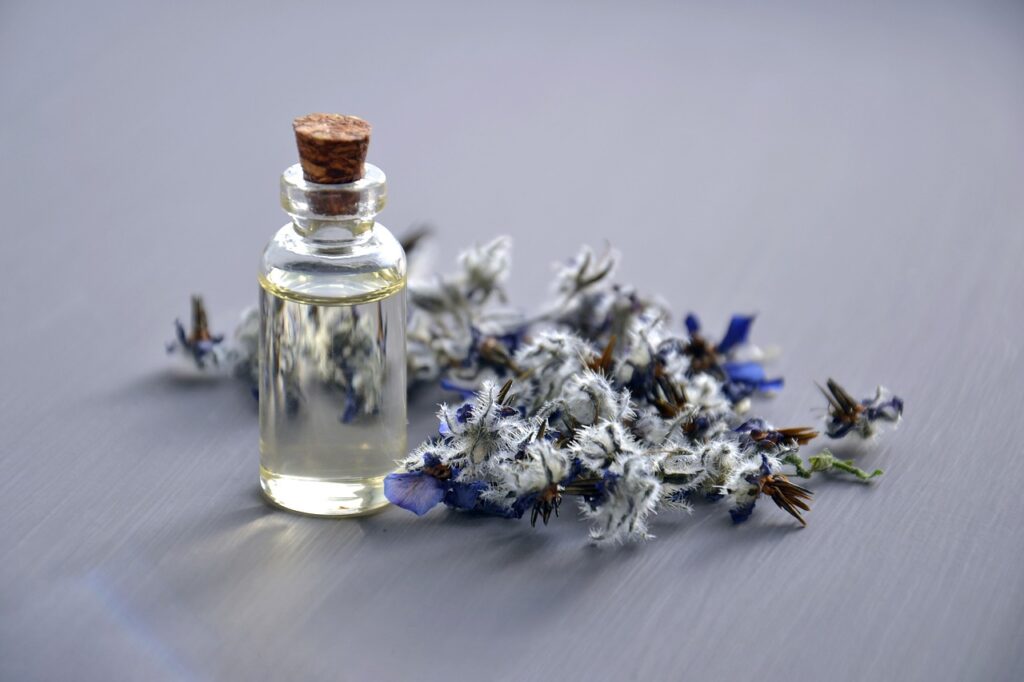The Basics of Essential Oils: What are they and how do they work?
The molecules in essential oils are extremely small, which allows them to penetrate our skin and enter our bloodstream through topical application or inhalation. Thus, when we use essential oils for aromatherapy or apply them topically, they interact with our body at the cellular level.
Each essential oil has its own distinct set of therapeutic benefits. For example, lavender oil is widely known for its calming properties, while peppermint oil is commonly used to relieve headaches and improve focus.
In addition to their physical effects on the body and mind, many people believe that certain essential oils also have spiritual benefits. Some essential oils are associated with chakras (energy centers), meditation practices or other healing modalities like Reiki and crystal therapy.
Overall, it’s important to note that although there is some scientific evidence supporting the effectiveness of certain essential oils for different health issues such as pain management or stress relief – more research is needed to fully understand how exactly these natural remedies work within our bodies!
Benefits of Essential Oils for Physical Health: From pain relief to immune support
Pain Relief
Many essential oils are known for their pain-relieving properties. Peppermint oil, for example, is commonly used to soothe headaches and migraines. Other oils like lavender, eucalyptus, and rosemary can be effective at reducing joint pain and muscle soreness.
Better Sleep
Sleep is vital for overall health and well-being. Essential oils like chamomile, lavender, and bergamot can help promote relaxation and improve sleep quality.
Boosted Immune System
Certain essential oils have antimicrobial properties that can help strengthen the immune system. Tea tree oil is one such oil that has been shown to fight off harmful bacteria and viruses in the body.
Ease Digestive Issues
Peppermint oil also has digestive soothing effects which aid with bloating gas or stomach discomfort as it possesses antispasmodic qualities aiding reduction of muscle contractions on intestinal walls effectively reducing indigestion problems while promoting healthy digestion.
(But do not consume any kind of pure undiluted essentail unless advised by an expert practitioner)
Emotional Healing with Essential Oils: How aromatherapy can help reduce anxiety and depression
Essential oils can be a powerful tool for those struggling with anxiety and depression. When used correctly, they can help reduce feelings of stress and promote relaxation while uplifting mood.
Lavender Oil:
Lavender oil is well known for its calming properties; it has been used for centuries to alleviate anxiety and sleeplessness. Inhaling lavender oil can help reduce perceived levels of stress hormones such as cortisol while promoting deep relaxation. This gentle yet potent oil is also thought to enhance overall mood.
Bergamot Oil:
Bergamot oil comes from a citrus fruit native to Italy; it has a bright aroma that’s often described as refreshing or uplifting. Bergamot oil has been found particularly effective at helping relieve symptoms of mild to moderate anxiety by activating neurotransmitters like serotonin within our brains’ chemistry responsible for regulating mood.. Diffuse this beautiful scent throughout your home or office when feeling particularly down or stressed out tends to produce a sense of calmness thus alleviating negative thoughts that lead into developing depressive behaviours
Frankincense Oil:
This ancient herb derived from Boswellia tree resin was traditionally used in religious ceremonies because of its ability to promote spiritual peace – making you feel calmer, more centered, and grounded when experiencing feelings associated with anxiety and depression. Its sweet, woody aroma can help alleviate symptoms of panic and despair while promoting relaxation so that you can think clearer.
Other oils like chamomile, ylang-ylang and rose are often used for their benefits in reducing stress levels. Aromatherapy blends such as a mix of lavender oil and bergamot are found helpful to elevate your mood.
It is important to note however, that essential oils should not be considered a substitute for professional medical care; seek advice from qualified healthcare professionals before using any essential oils if already receiving medication or undergoing therapy to reduce anxiety and depressive symptoms..
In conclusion, Essential oils offer an effective natural alternative for those looking for ways to manage their emotional health issues without the side effects that come with traditional medications. Always use high-quality essential oils, follow safe usage guidelines, and ask a healthcare provider how best aromatherapy can support your emotional wellbeing.
Using Essential Oils in Daily Life: Recipes for homemade cleaning products, skincare, and more
Lemon essential oil is a great option for removing grease and grime from surfaces like stovetops, counters, and sinks. Simply mix a few drops with water or vinegar in a spray bottle and use as needed. For an all-purpose cleaner that smells amazing, combine equal parts lemon oil and lavender oil with distilled water.
Tea tree oil is another powerful agent for disinfecting surfaces thanks to its antibacterial properties. Mix it with baking soda or borax for extra scrubbing power on tough-to-clean areas like tubs and showers.
In addition to cleaning products, you can also incorporate essential oils into your skincare routine. Frankincense oil has been shown to have anti-aging benefits when used topically on fine lines and wrinkles, while peppermint oil can soothe sore muscles when added to bathwater or massage lotion.
If you struggle with acne-prone skin, tea tree oil may be your new go-to ingredient. Mix it with witch hazel (another natural toner) in a small spray bottle for a refreshing facial mist that helps prevent breakouts.
Finally, don’t forget about incorporating essential oils into your self-care routines as well! Lavender oil is known for its relaxing properties when diffused before bed or added to bathwater; bergamot oil can help promote feelings of positivity during meditation or yoga practice; eucalyptus oil can open up airways during cold season.
Overall, essential oils are versatile and easy to incorporate into your daily routine. Just be sure to do your research on safe usage and dilution ratios before getting started!
Safety Tips for Using Essential Oils: Avoiding allergic reactions and other potential risks
Avoid applying undiluted essential oils directly onto your skin. Essential oils are highly concentrated substances that should always be diluted with a carrier oil such as coconut or almond oil before being applied topically. Applying them directly onto the skin can cause irritation, itchiness, redness, or even burns in some cases.
Perform a patch test before using any new essential oil. Even if you have used an essential oil before without experiencing any adverse effects, it’s still best practice to perform a patch test on your inner elbow or wrist at least 24 hours before using the same essential oil again or trying out a new one. This will help you identify any potential allergies or sensitivities and take appropriate action accordingly.
Avoid ingesting essential oils unless under professional guidance. Some people believe that taking small amounts of certain essential oils by mouth can provide health benefits; however, this is not recommended without seeking advice from a qualified aromatherapist, herbalist or medical practitioner as inappropriate ingestion of some pure essential oils could lead to serious poisoning incidents.
Avoid exposing pets and children to undiluted fragrances, only use them when well ventilated spaces and keep away from their direct inhalation especially newborns (the respiratory systems of infants are particularly delicate). Pets like dogs rely heavily on olfactory senses so care needs taking with regards sensory overload which might overwhelm them,. Essential Oils intended for diffusing usually need diluting too due to concentration levels because what smells nice for humans might be overpowering for pets who would need smaller amounts to experience the same benefits.
Avoid using essential oils near open flames and heat sources. Essential oils are highly flammable, so keep them away from candles or burners that produce an open flame or other sources of high heat. If you’re using a diffuser, make sure it has automatic shut-off features for safety purposes
Avoid sun exposure after applying certain essential oils topically. Citrus-based essential oils like lemon, lime, grapefruit can cause photosensitivity with sunlight and should be avoided in Tanning booths too due to risk of skin burns . To avoid this reaction don’t apply those specific essences topically especially within four hours prior to outdoor activity.
In summary, always remember that “less is more” when it comes to using essential oils. Always use high-quality therapeutic grade products tested with GC/MS laboratory equipment if possible; do not rely on price alone as quality indicators. By following these simple yet important safety tips and precautions, you can enjoy the healing power of aromatherapy without any adverse effects.
Choosing High-Quality Essential Oils: How to find the best brands and avoid synthetic oils
Here are some tips for selecting the best essential oil:
- Research Brand Reputation: Do your research before purchasing any essential oils. Check out customer reviews online and consult with other users about their experience with different brands. Look for companies that offer transparency in their sourcing process.
- Pick a Company That Specializes in Essential Oils: Choose a company that specializes in creating high-quality essential oils and has experienced aromatherapists, botanists, and chemists on staff. Such professionals can ensure quality control at every stage of production.
- Avoid Synthetic Oils: Be wary of “fragrance oil” or “aroma oil.” These types of oils may contain synthetic chemicals that do not provide therapeutic benefits like pure essential oils do. Read labels carefully!
- Beware Cheap Prices: Pure essential oils need large quantities of plants, flowers or fruits — sometimes thousands! Keep this fact when evaluating prices too good to be true.
- Evaluate Packaging Carefully:The packaging matters regarding preservation since light degrades these aromatic compounds over time.A dark glass bottle will prevent exposure from sunlight as well as direct heat sources making sure your precious investment lasts longer. .
In conclusion, finding high-quality essential oils involves doing your research, choosing reputable brands, and avoiding synthetic oils. By taking these steps, you can experience the full range of healing benefits essential oils have to offer.




